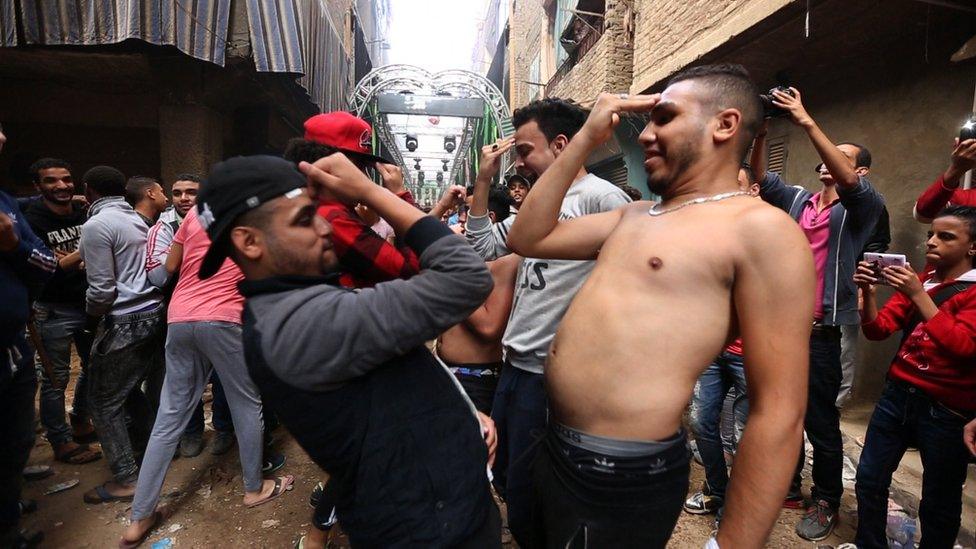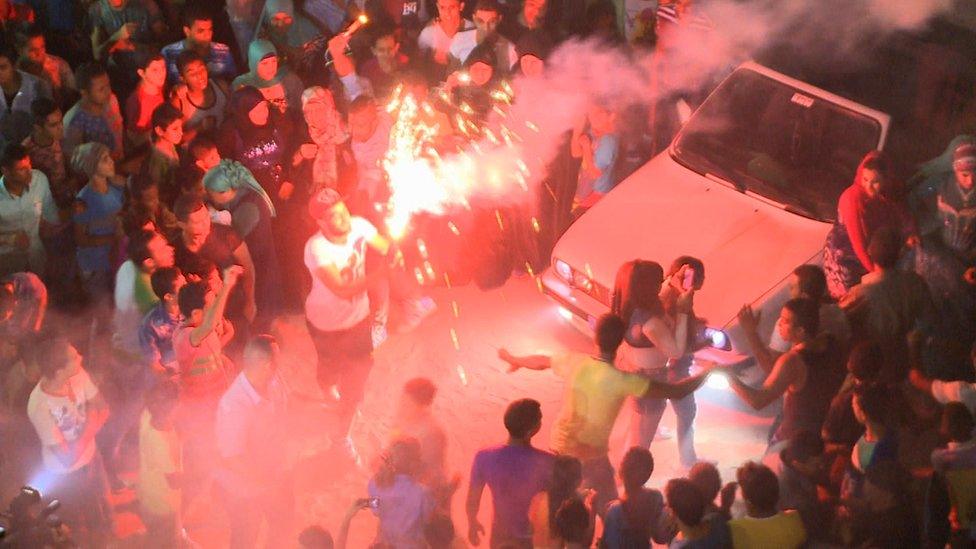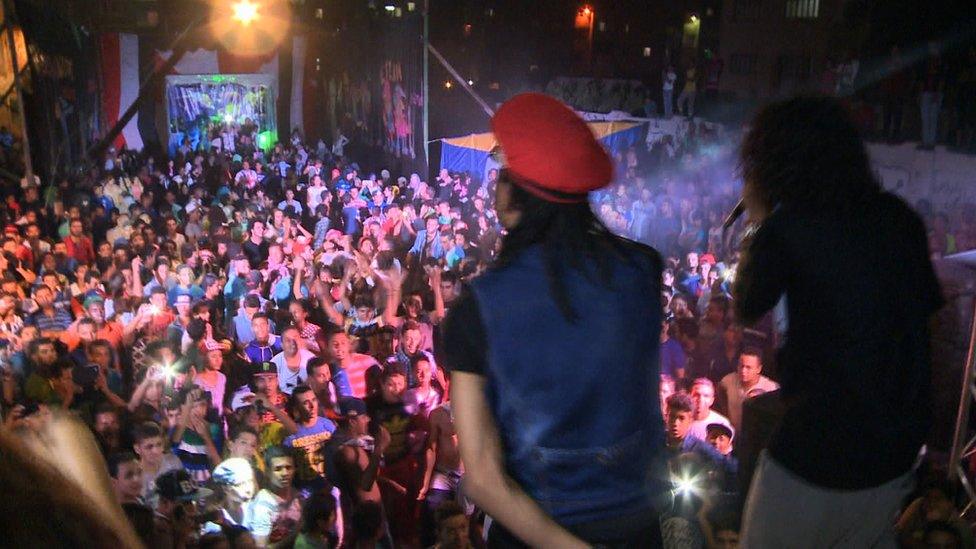The music craze with a dark side splitting opinion in Egypt
- Published

Mahragan is gaining a mainstream following but has been criticised for its lyrics
In the middle of a narrow alley in Cairo's Ain Shams district, one shop stands out from the rest.
While it could be missed from the outside, step inside and you enter a world of neon graffiti, pulsating beats and urban youth.
Here the Samaka band is busy making Egypt's latest genre of music, mahragan.
Arabic for "festival", mahragan can best be described as loud, crazy, digital tunes, with repetitive beats and lyrics.
It came from the slums of Egypt's big cities and has rapidly spread across the Arab world.
Samaka's "studio" consists of one laptop, a small table and a stand microphone - with no musical instruments in sight.
Examples of mahragan on Cairo's streets and in the clubs
Kamal Agwa, one of the band's singers, stands behind a "pop" shield, getting ready to record a new song.
"When a customer comes asking for a unique song, we tailor the lyrics for him so that it includes his name," he says. "We charge little, and sometimes we do it for free."
Mahragan songs are increasingly heard at wedding and birthday parties, and were even used by some candidates in recent parliamentary election campaigns.
"There is such a big demand for our music," lyricist Rami Ramadan says.
"I'm writing so many lyrics that I lose their track. It's quite a surprise for me to hear a track playing somewhere and realise it's actually my own song!"
Music 'fad'
You can hear mahragans in almost every neighbourhood in Egypt.
Relaxing at a street cafe is now commonly interrupted by the music belting out of taxis and tuk-tuks. Like it or lump it, there no way of avoiding it.
Critics believe that this genre of music has little room for creativity and sounds all the same.
"Sometimes people are just eager to listen to any type of music," says musician Hani Muhanna, who has been producing some of Egypt's best-loved songs since the 1970s.
"This type of music won't leave any significant mark on the music industry and will disappear over time. Just because a song has gone viral doesn't mean it's brilliant. We see strange and offensive videos go viral all the time."

Extreme dancing is part of the mahragan craze

The new street music has spread rapidly across Egypt and other parts of the Middle East
Nasser Gandhi is a singer with the mahragan Shubaik Lobaik band, which produced hit song There Ain't No Such Thing as a Real Friend. The track has been viewed more than 30m times on YouTube, external.
Aged just 17, Gandhi has a huge fan-base among lower- to middle-class young men and women.
He says mahragans express the struggles some people face daily. However, despite its success, the hit-song's lyrics have been criticised for allegedly inciting violence.
"Show me whatever weapons you have. When you strike me, I will strike you back. I will smash you in the face so that it doesn't look the same. If you retreat, then you are a woman and not a real man," Gandhi sings on the record.
"I never imagined that our song would go viral this way," he says.
"Our lyrics are the words we hear on the street. When someone attacks you, you can't be patient and call the police. You must defend yourself to survive. That's the reality that we're facing now and we have to deal with it."
Gangster rap
Prominent Egyptian blogger Wael Abbas opposes any kind of censorship of music but believes that this type of song promotes macho culture and glorifies gang violence.
"The lack of law and order in the slums following the revolution has meant that people began arming themselves in order to protect their areas," he explains.
"These young people were and still are, heavily influenced by gangster rap music from the United States, so much that one of them has even called himself Alaa 50 Cent - after American rapper 50 Cent," Mr Abbas says.

Mahragan events can draw thousands of revellers
A few weeks ago, a large, young, male-only crowd descended on Bulaq Dakror neighbourhood in Cairo, for the wedding party of mahragan singer Basala. They danced wildly, some without their shirts.
Huge speakers outside the bride's house thumped out the mahragan sound, the surrounding narrow alleyways jammed with party-goers.
Exuberant young men climbed drain pipes to get a better view as fireworks lit the sky and a flaming trail of kerosene on the ground added to the trance-inducing atmosphere.
While Wael Abbas does not believe the lyrics incite violence, he thinks they are still honouring thugs.
However Nasser Kamel, who made the music video for Nasser Ghandi's controversial song, disagrees: "We are not inciting violence, we are not thugs, I am a good man. We are just making songs. The mention of weapons in the song could actually be a reference to paper and pens."